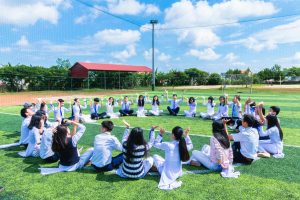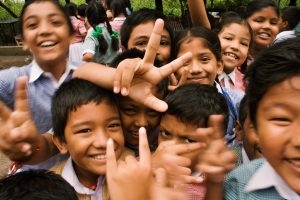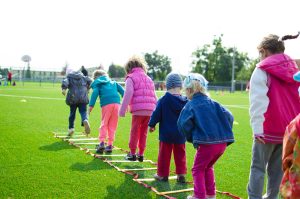School
The Basic School focused on elementary education. While researchers at the Foundation prepared this report, we visited dozens of elementary schools from coast to coast. We were in hundreds of classrooms. And, quite frankly, I was often amazed at how eager students were, how devoted teachers were, and how dedicated principals were, performing heroic feats every day, succeeding, oftentimes under very tough conditions. And I concluded most school critics could not survive one week in the classrooms they so vigorously condemn. In addition, after discussing this with principals and teachers, I am now also convinced that the last thing we need in America today is yet one more pilot project or novel experiment in education.

COMMUNITY
We say, in the new Carnegie report, that building a true community of learning is the first and most essential ingredient of an effective school. We saw in our study that educational excellence cannot be achieved at a school where purposes are blurred, where teachers and students do not communicate thoughtfully with each other, and where parents are uninvolved in the education of their children. Community is, without question, the glue that holds a potent school together. But by community, we mean much more than a television slogan or a postcard for parents at the beginning of the year.
A CURRICULUM WITH COHERENCE
Beyond community, the second building block of the Basic School is a curriculum with coherence, which begins with language proficiency. Lewis Thomas captured the spirit of the Basic School when he said that childhood is for language. And the Basic School is a language school a place where every student is expected to read with comprehension, write with clarity, and effectively speak and listen, since it’s through the miracle of words that we are socially connected and intellectually empowered. But in the Basic School, language is defined broadly to include not just words, but also mathematics, as well as the universal.
EIGHT CORE COMMONALITIES
In the Basic School, we recommend a course of study that is both comprehensive and coherent. But it’s not so much a new curriculum as a new way to think about the curriculum. Specifically, in Basic School, all of the traditional academic subjects are still there from science to history, to civics and literature but they are framed within eight integrative themes based on the universal human experiences that we share as well.
These eight themes, which we call the Core Commonalities include the Life Cycle, the Use of Symbols, response to the Aesthetic, Membership in Groups, a Sense of Time and Space, Producing and Consuming, Connections to Nature, and Living with Purpose. More directly, this is a spiraling thematic approach from kindergarten to the fifth, sixth, or even the twelfth grade vertically, it not only gives all learners a core of basic knowledge but also leads them to discover connections between disciplines. This also allows the students to see how what they learn in class applies to
their own lives, and how the different cultures of the world have different expressions to put forward the similarities.

ASSESSMENT
Before leaving the subject of the curriculum, I would be remiss not to note that the Basic School is dedicated to another evaluation process as well. High achievement expectations and standards are established for both literacy and general knowledge, with an expectation that all students will succeed.
Once again, though, the Basic School evaluation is integrated into the process of teaching and learning. And we abhor testing as a game of gotcha in which schools end up measuring that which matters least. James Agee once wrote, With every child who is born, under no matter what circumstance, the potentiality of the human race is born again. In the Basic School assessment is built into instruction. The aim is to open rather than close the possibility of each student’s potential being realized.
CLIMATE FOR LEARNING
This brings me to priority number three. Beyond community and a curriculum with coherence, the third building block of the Basic School is providing a climate of active learning in the classroom. Several years ago, I walked unannounced into a fifth-grade classroom in New Haven. Thirty inner-city students were crowded around the teacher’s desk. My first impulse was to run down the hall and call the central office to report an emergency.
But I stood there and began to realize it wasn’t a crisis, but rather a moment of magic. They had just finished reading Oliver Twist by Charles Dickens, and they were debating with much passion whether Little Oliver could make it in their hometown. They argued that, while he could survive in distant London, he’d never survive to tell in New Haven, a much tougher city. They found out how great literature relates to the reality of life.
CLASS SIZE
But to have such success, classes have to be smaller, especially in the early years, because little children just need a lot of attention on an individualized basis. To state that class size doesn’t matter is frankly ludicrous. They never taught kindergarten or first grade or never took
their grandchildren to McDonald’s.
RESOURCES
The climate for learning includes the basic resources building blocks to books to new electronic teachers that can reach children in classrooms around the world with networks of knowledge, excitingly revealed in this new Batten Learning Center here at Norfolk Academy.

Conclusion
We also suggest that each Basic School make health and counseling available to children who are abused. A sad chapter in our study of elementary education was the frequency with which principals and teachers spoke to us about children who are neglected and maltreated. One Friday afternoon we listened, along with a group of weary teachers, in an elementary school in a mid-sized city.
The Basic School living, thriving community learning, coherent curriculum, creative learning, and building character. And in this final moment, I’d like to close with what Grandpa Boyer would have called a benediction. Very personally, I want to thank God for the help I have felt in completing this report at a special time of challenge and express my hope that The Basic School will be of special benefit to all children but most especially to those who are less advantaged.
